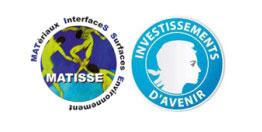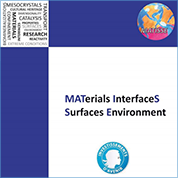Biomineralization
Objectives
The field of biomineralization is intrinsically an interdisciplinary field of research, from physics to environmental sciences. In the frame of the MATISSE project, three main aspects of this multi-facetted topic were to be studied: (i) biomineralization per se, i.e. the structure-function relations in biominerals, and especially the identification of molecular mechanisms leading to their formation as well as the identification of the respective roles of biological control vs. environmental control ; (ii) biomimetism, i.e. how to make full use of the lessons from nature in the domain of materials synthesis, following an integrated approach that starts from biominerals characterization from a structural, physical and functional point of view and ultimately allows for their reproduction in vitro; (iii) bio-inspiration, i.e. understanding and using the mutual transduction of information between the inorganic and the biochemical world to achieve non-biogenic functional materials. This topic had important resonance with Axis 2 but with a more focus interest on the use of biological systems as source of materials or functions
Partner Teams
BOREA, ENS GEOL, IMPMC, INSP, LCMCP, LMCM, LRS, METIS, PHENIX
Funded Projects
The funded projects were extremely diverse and covered the whole area of the axis 1 objectives:
(i) study of biomineralization processes in the environment and in whole organisms
- Origin of calcified roots (rhizolites) in terrestrial sediments (METIS-LMCM) –Post Doc
- Biological apatite fossilization: cristallochemical approaches and geochemical applications (LMCM-IMPMC)-PhD
- Biomineralization processes and electronic transfers in bacterial sulfatoreduction (IMPMC-LCMCP)-PhD
- Shell growth during the development of the European Haliotis tuberculata elm (LCMCP-BOREA)-PhD
(ii) model systems allowing for study and comprehension of biomineralization processes
- Carbonate biomineralization : from model systems to living cells (LRS-IMPMC)
- In situ study of apatite formation in bone tissue models (LRS-LCMCP)- PhD
- A theoretical study of surfaces and adsorption properties of biominerals (LCMCP-IMPMC-PHENIX)- Financial support
- Towards a microfluidic model for the comprehension of calcium oxalates precipitation : correlation with renal pathologies (LCMCP-PHENIX)-Post Doc
(iii) biomineralization applied to materials science
- Silica-pectin bionanocomposites : from hosts for cell encapsulation to materials for decontamination (LCMCP-ENS Geology)- Financial support
A 2 months professorship grant for Pr A. Templeton (CU Boulder) was also funded. During her stay, a 1-day workshop on Mechanisms of mineral formation, surface-catalysis and electron-transfer processes at inorganic and biological interfaces was organized. A 1 week international school Biomineralization short courses was also organized by the Axis 1 committee with the co-funding of CNRS (92 attendees).
Highlights
A novel mechanism of alkaline earths fractionation during cyanobacteria biomineralization was evidenced by LRS and IMPMC. Cyanobacteria grown in Ca2+, Ba2+, Sr2+ mixtures produce intracellular particles with BaCO3/SrCO3/CaCO3 multilayer structures (as observed by STEM/EDX on the figure) whereas single-phase carbonates were obtained in abiotic carbonatation conditions. This suggests that biomineralization occurs under the biological control of the ion uptake kinetics.
Fig.1 : Project with J.F. Lambert (LRS) and K. Benzerara (IMPMC) as co-P.I. - PhD work of N. Cam
More than 90 participants (50 % PhDs/post-docs and 20 % foreigners) attended the Biomineralization short courses organized in December 2014. 12 h of courses given by international experts (USA, Canada, Germany,…) with 19 invited talks and 20 posters. Courses were video-recorded and are freely available on MATISSE website. Selected papers will be published in a special issue of Minerals.
Scientific production
- 1 paper is under work with minor revisions (Geochimica et Cosmochimica Acta)
- 1 international and 1 national oral presentations
- 2 international poster presentations
- 1 invited paper in Elements Magazine on emerging frontiers between geomicrobiology and material science.
Benefits of MATISSE
Biomineralization research is often conducted in each discipline independently, especially in France where interdisciplinary teams are scarce. A number of SU/UPMC laboratories have a significant expertise in the field, from a biological, chemical and geochemical perspective, but no firm collaboration existed between them in the area of biomineralization. The MATISSE program therefore constitutes a unique opportunity to make important and original contributions to this field.
The MATISSE program was successful in establishing such collaborations as 8 over 9 of the funded projects involved at least two different disciplines, with a good balance between chemistry, physics and Earth science. Furthermore most recent funded projects show a clear trend towards an increased diversity of approaches (such as theoretical chemistry) and applications (medicine, bioremediation).
The MATISSE funding of the Biomineralization short courses provided a unique opportunity for students to hear and meet international and national experts in a wide range of areas, from paleontology to medicine but also to discuss with other students working in these fields. It also allowed gathering the French community working in biomineralization. Ultimately, it granted an excellent international visibility to the Labex teams and, on a larger level, to SU.
Also in the section
Key figures
MATISSE :
4 disciplines
- Chemistry
- Physics
- Earth Science
- Cultural heritage
18 partners
400 researchers
Contact
Direction :
Florence Babonneau
Administration :
Laurence Bonnet-Lericque
Communication :
Tél. (33) 1 44 27 62 36




